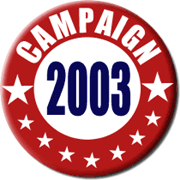 The Six Questions1. Paying for Sewage Systems2. Paying for Schools in Small Cities 3. Non-Partisan Elections 4. City Purchasing 5. Government Administration 6. Class Size Overview of Ballot Proposals Related LinksNew York City Campaign Finance Board - Voter's guide provides information on ballot proposals and candidates.New York City Board of Elections New York City Charter Commission |
QUESTION 1: PAYING FOR SEWAGE SYSTEMS
Currently, municipalities in New York State do not have to count construction and repairs to sewer facilities toward the amount of money they can borrow. This allows counties, cities, towns, and villages to make repairs that they might not otherwise be able to afford without having to choose between sewage and other building projects. This exclusion was first enacted in 1963 and will expire in 2004. This proposal would extend it for another ten years until 2014. (Text of the question as it will appear on the ballot.)
Although it would primarily affect small counties upstate, all voters in the state - including New York City voters who are not affected - have a say on this proposal because their taxes will pay for sewer repairs. (Read more about sewage construction in New York City)
PRO
Proponents say that this measure gives municipalities the flexibility to make the repairs they need. Assemblymember Robert Sweeney of Suffolk County, who sponsored the measure in the Assembly, said it mostly will help small upstate communities that have small tax bases by allowing them to borrow for critical sewer projects without having to postpone building roads and schools.
CON
Few lawmakers argue against the need to build and repair sewer systems. In fact, when the bill went through the State Legislature, no lawmakers or organizations actively opposed it. However, voters are not as eager to allow the government to take on additional debt. In 1993, when this same measure appeared on the ballot, it passed by only 22,000 votes out of 2.5 million votes cast.
The Six Questions
1. Paying for Sewage Systems
2. Paying for Schools in Small Cities
3. Non-Partisan Elections
4. City Purchasing
5. Government Administration
6. Class Size
Overview of Ballot Proposals




